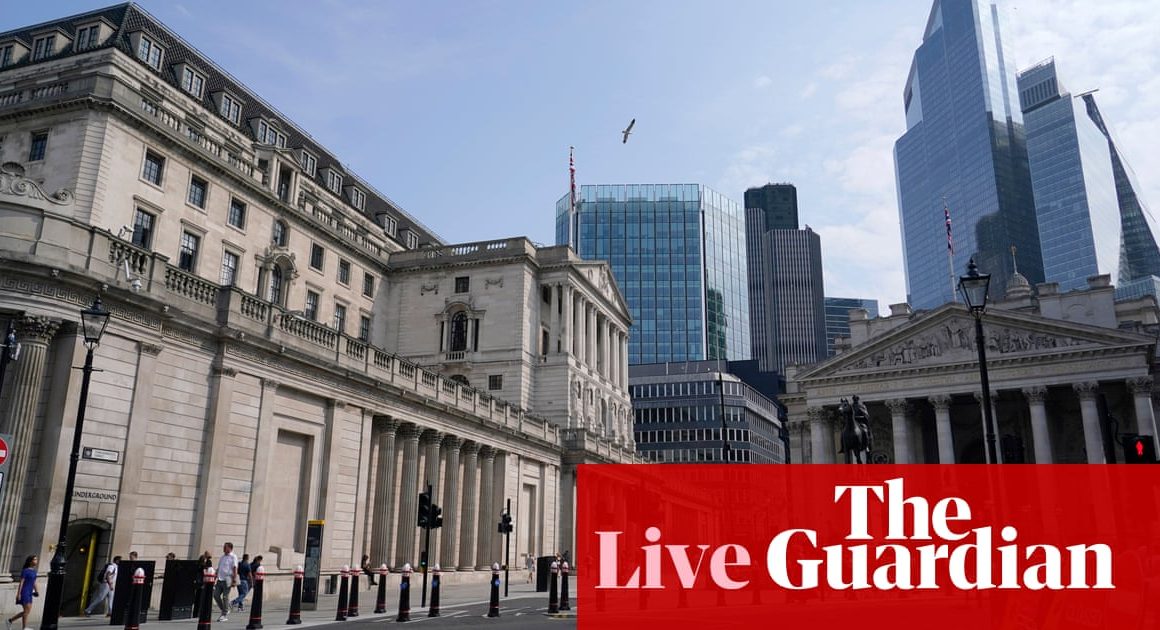UK factories report strongest month in over two years
Britain’s manufacturing sector grew at the fastest pace in over two years in August, new data confirms.
The UK manufacturing PMI, which tracks activity across the sector, has hit a 26-month high last month.
The recoveries in output, new orders and employment continued in August, data provider S&P Global reports, lifting the PMI to 52.5 in August, up from 52.1 in July (and matching the flash estimate from mid-August).
Manufacturers also benefitted from easing price pressures, with the rates of inflation in input costs and selling prices both slowing.
Activity was driven by higher domestic demand, while new export orders decreased for the thirty-first consecutive month.

The report suggests that the UK manufacturing sector boosted economic growth last month, despite concerns that the recovery is slowing after a strong first half of the year.
Rob Dobson, director at S&P Global Market Intelligence, explains:
The upturn is broadbased across manufacturing, with the investment goods sector the stand-out performer.
The upturn continues to be driven by the domestic market, which is helping to compensate for lost export orders. The trend in export orders a key cause for concern, with new business from overseas having fallen continuously since early in 2022.
UK manufacturers are experiencing difficulties in securing new contract wins overseas due to weaker demand from Europe, a slowdown in mainland China, freight delays, competitiveness issues, high shipping costs, global conflicts and political uncertainty.
Many of these issues are also impeding imports which, while benefiting domestic suppliers, is causing supply chain-related production constraints as witnessed by a further marked lengthening of supplier delivery times.
Key events
Over in Pakistan, inflation has fallen into single-digits for the first time in almost three years.
Consumer price inflation across Pakistan fell to 9.64% in August, down from 11.09% in July, the lowest rate since autumn 2021.
This could help Pakistan’s central bank to cut interest rates, easing pressure on households who face higher taxes on farm incomes, and higher electricity prices, through a loan deal agreed with the International Monetary Fund.
UK heading for “above-average growth”, predicts Peel Hunt
UK investment bank Peel Hunt have an upbeat take on the UK economy, saying there are three reasons for optimism: healthy balance sheets in the private sector; improving economic fundamentals; and stable politics.
In a new research note, they say:
-
The UK positioned for a protracted period of above-average growth, benefiting from increasing business investment, improving consumer demand, stabilising inflation and lower interest rates.
-
The new government not only brings political stability and clarity, but also has a firm growth agenda. This is evident from the Pensions review and the FCA’s competitiveness review, which we see as the start of a comprehensive change in approach.
-
The mood change in the UK is palpable, which should bring stronger earnings growth and increased investor appetite.
NeoEnergy to ‘materially slow down’ North Sea operations after tax increases
NeoEnergy, an independent oil company operating in the North Sea, has decided to scale back its investment in the area – blaming recent tax rises.
NeoEnergy says the UK government has announced “a number of measures” in recent weeks which have materially increased the level of uncertainty in the UK’s oil and gas sector.
These include a consultation on new environmental guidance in relation to oil and gas projects, which won’t conclude before spring 2025, and plans to raise the windfall tax on North Sea producers from 35% to 38%.
Neo says:
Against this uncertain backdrop, NEO and its 100% owner HitecVision, have taken the decision to materially slow down investment activities across all development assets in its portfolio.
This will affect the Buchan Horst redevelopment, off the coast of Aberdeen.
Labour have also pledged to end new North Sea exploration licences.
August’s UK Manufacturing PMI suggests that activity in the sector is recovering strongly and the economy is in a reasonable strong shape, says Professor Costas Milas, of the University of Liverpool’s management school.
And that could take pressure off the Bank of England to lower interest rates soon.
Professor Milas explains:
To understand the implications of this for UK interest rates today and in the near future, one needs to look at the wider context of the latest wage increases. This LSE Business Review blog of mine finds that the latest public sector wage settlements will push up wages in the private (including manufacturing, of course) sector also and eventually add to some inflationary pressures by mid-2025.
The implication for the BoE is that interest rates should be kept at 5% in September and, from there onwards, the BoE should resist the pace of interest rate cuts financial markets currently expect (markets expect a 4.2% Bank Rate for 2025Q3).
REA Group’s interest in Rightmove could reflect expectations that the housing market will strengthen as the Labour government cracks on with plans to boost housebuilding.
Russ Mould, investment analyst at AJ Bell, explains:
The UK property market is traditionally vibrant under normal economic circumstances. Once you consider the new Labour government has pro-housing policies and a strategy firmly focused on improving the UK economy, there is the potential for Rightmove’s earnings to be much stronger in time.
“REA could take a long-term view and buy the business now while sentiment is patchy and pay much less than if it had bought at the peak of the property market.
Mould also suggests we could see a bidding war for Rightmove:
“Rightmove is a unique asset on the UK stock market and shareholders are unlikely to accept the first bid that comes along. It is the dominant property portal in the UK and should command a premium takeout price.
Shareholders might be frustrated at the recent share price performance, but if they’ve stuck around for the past year then they’ve clearly got their eye on the long-term prize, otherwise they would have jumped ship by now.
UK manufacturing PMI strengthens: What the experts say
August brought solid growth for UK manufacturers despite ongoing export challenges, reports Mike Thornton, national head of manufacturing at RSM UK:
“The manufacturing PMI saw solid growth in August increasing to 52.5, the highest level since June 2022. This upward trend, combined with an increase in the employment index to 52.5, signals real confidence as businesses invest in resource and capacity in expectation for a strong pipeline of work.
The backlogs of work index has recovered and reached an equilibrium between demand and output. As output has been increasing month on month since the start of the year, albeit with some slight monthly fluctuations, the overall trend demonstrates the sector’s recovery is driven by new orders coming in, rather than running through backlogs of work.
However, this demand is coming from domestic markets, as new export orders have ticked down sharply, which could be due to geopolitical tensions, shipping challenges, and a downturn in activity in key markets, including the Eurozone and China.”
Boudewijn Driedonks, partner at McKinsey & Company, points out that the UK’s factory sector is doing rather better than its eurozone counterparts (as covered earlier):
“UK manufacturing expanded for the fourth consecutive month. The rise to 52.5 on the S&P Global PMI is a bullish sign for UK GDP, as it hits its fastest rate of growth in over two years. Underlying results show that strong domestic demand and destocking compensated for weak demand from overseas, including the Eurozone and China.
And, that business confidence has increased. This month’s results also provide good news for job creation, which showed an increase. Less positively, input prices are still on the rise, as are output prices, although this is somewhat easing”.
“The Eurozone’s trend is quite the contrary, with opposite results on virtually all dimensions except for inflation. Manufacturing in August remained under pressure with the Eurozone PMI staying steady at 45.8, continuing its contraction. It was a story of two tales with Greece, Spain and Ireland showing growth and Italy virtually holding steady, whilst its two largest manufacturing hubs, France and Germany, both suffered setbacks to drag down the Eurozone as a whole. France saw a 7-month low, and Germany saw a 5-month low.
Worryingly, supplier performance continued to deteriorate in August, leaving UK factories waiting for materials.
This is due to the ongoing Red Sea crisis, longer shipment times from China, freight shortages and vendor capacity issues, S&P Global reports.
UK factories report strongest month in over two years
Britain’s manufacturing sector grew at the fastest pace in over two years in August, new data confirms.
The UK manufacturing PMI, which tracks activity across the sector, has hit a 26-month high last month.
The recoveries in output, new orders and employment continued in August, data provider S&P Global reports, lifting the PMI to 52.5 in August, up from 52.1 in July (and matching the flash estimate from mid-August).
Manufacturers also benefitted from easing price pressures, with the rates of inflation in input costs and selling prices both slowing.
Activity was driven by higher domestic demand, while new export orders decreased for the thirty-first consecutive month.
The report suggests that the UK manufacturing sector boosted economic growth last month, despite concerns that the recovery is slowing after a strong first half of the year.
Rob Dobson, director at S&P Global Market Intelligence, explains:
The upturn is broadbased across manufacturing, with the investment goods sector the stand-out performer.
The upturn continues to be driven by the domestic market, which is helping to compensate for lost export orders. The trend in export orders a key cause for concern, with new business from overseas having fallen continuously since early in 2022.
UK manufacturers are experiencing difficulties in securing new contract wins overseas due to weaker demand from Europe, a slowdown in mainland China, freight delays, competitiveness issues, high shipping costs, global conflicts and political uncertainty.
Many of these issues are also impeding imports which, while benefiting domestic suppliers, is causing supply chain-related production constraints as witnessed by a further marked lengthening of supplier delivery times.
Looking back at Rightmove….analysts at Jefferies point out there aren’t many cross-border synergies between it and Australian potential-suitor REA Group.
In a research note this morning, Jefferies asks “What can REA bring to Rightmove?”, saying:
Cross-border synergies are de minimis in this business model. Value creation will therefore be a function of REA bringing strategic and execution insights to what is already a tightly managed business.
Notwithstanding, it is worth crediting REA with being a strong operator in Australia, having taken revenue share from the #2 player DHG in the last six years. REA has a world-class product development team, having introduced several depth products in the past. In addition, REA has a strong mortgage broking business, Mortgage Choice, and has done commercial RE and rentals for a long time; mortgages, commercial and rental services are Rightmove’s Strategic Growth Areas
Eurozone manufacturing “going downhill, and fast”
Just in: Eurozone manufacturing remains in contraction, weighed down by Germany and France.
The latest healthcheck on the eurozone’s factory sector confirms that activity continued to contract in August.
The HCOB Eurozone Manufacturing PMI, has come in at 45.8 in August, for the third month running. Although it’s slightly higher than the ‘flash’ reading of 45.6, it shows the sector contracted again.
Dr Cyrus de la Rubia, chief economist at Hamburg Commercial Bank, says:
“Things are going downhill, and fast. The manufacturing sector has been stuck in a rut, with business conditions worsening at the same solid pace for three straight months, pushing the recession to a gruelling 26 months and counting. New orders, both domestic and international, are slowing down even more, dashing any short-term hopes for a rebound.
Adding insult to injury, input prices have been creeping up again since June. There is a silver lining insofar as companies managed to pass some of these higher costs onto their customers in August.
France’s manufacturing PMI hit a seven-month low, while Germany’s was the lowest in five months.










